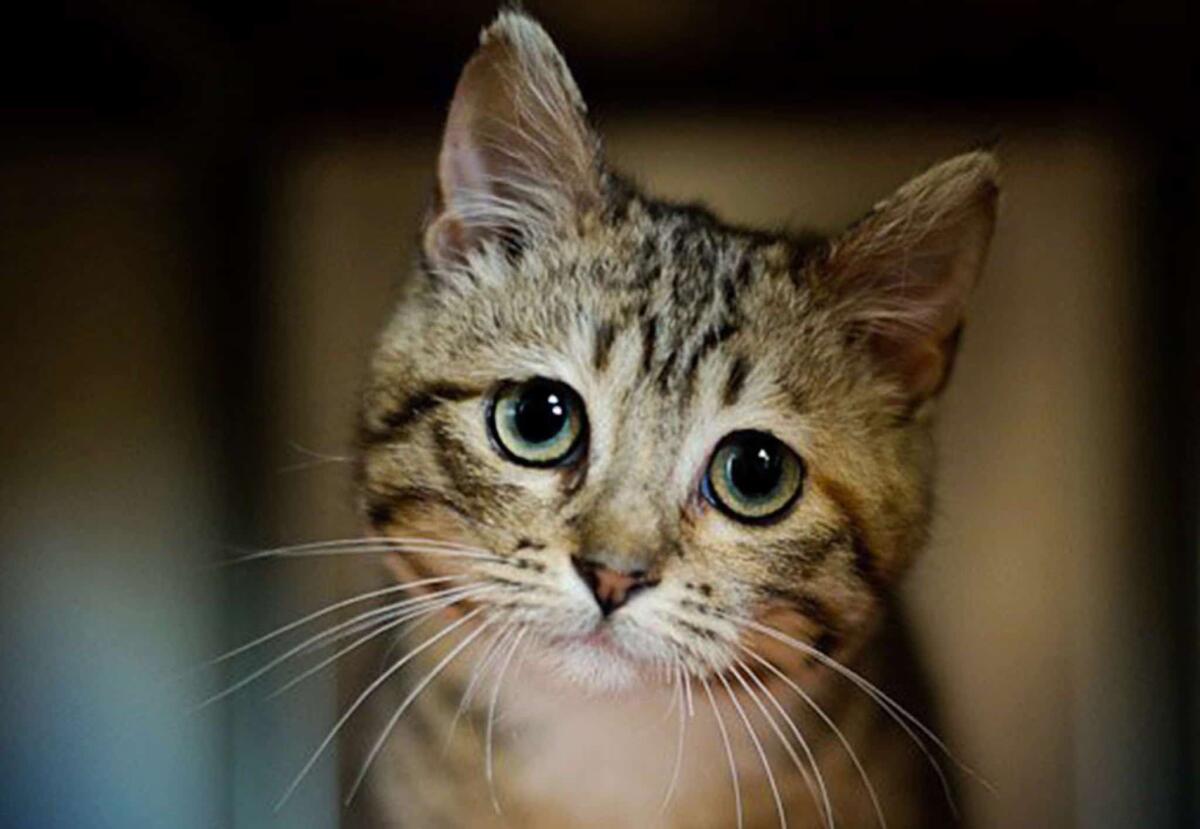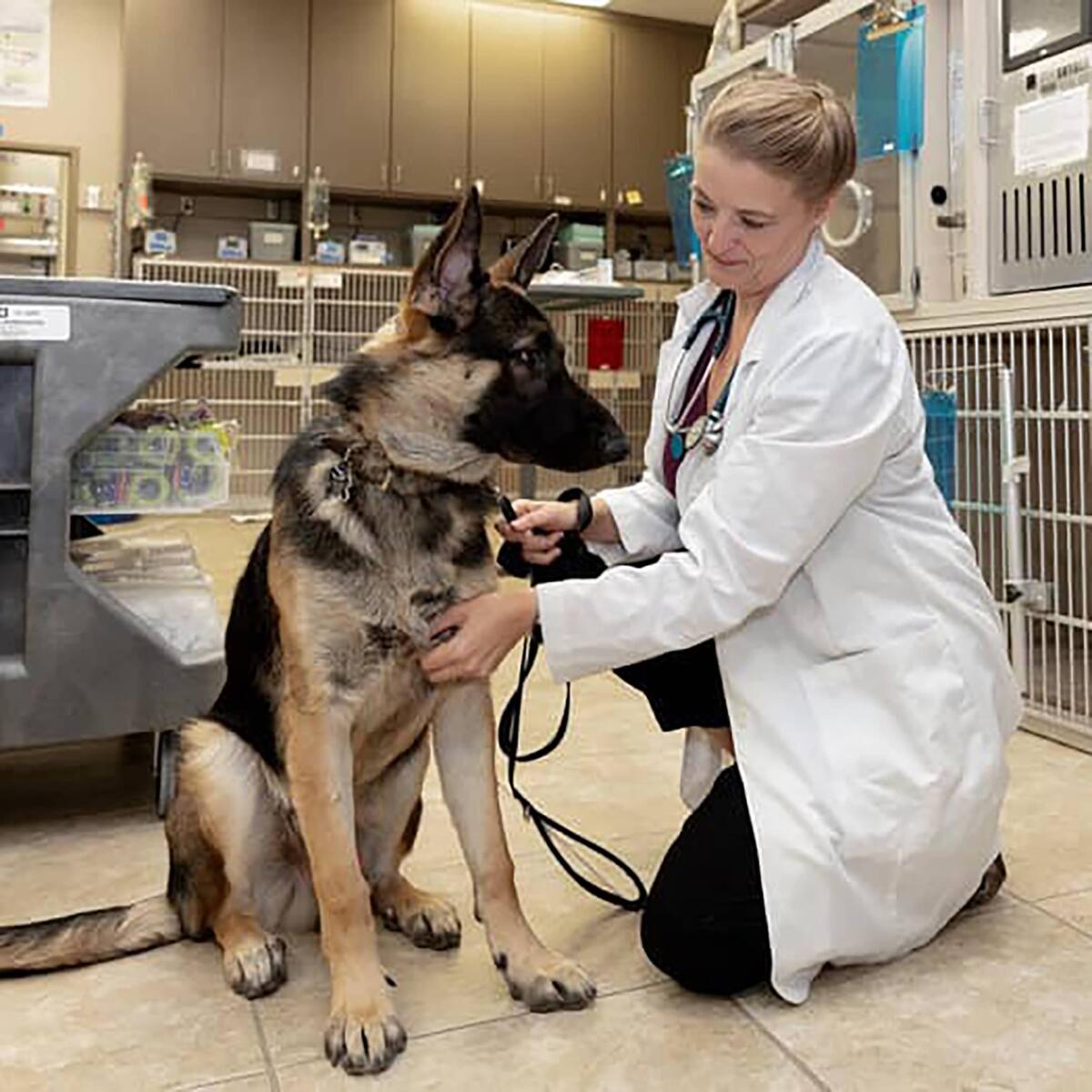The sad reality for veterinarians during the pandemic

Good morning, and welcome to the Essential California newsletter. It’s Monday, Sept. 27. I’m Justin Ray.
Trigger warning: This story discusses suicide.
A lot of people think veterinarians have such a fun job. However, the field has many stressors that can lead to a tragic outcome. A 2018 CDC study found that male veterinarians were 2.1 times as likely to die from suicide as the general population. Female veterinarians were 3.5 times as likely.
Dr. Carrie Jurney is the president of the San Francisco-based organization Not One More Vet, a charity that hopes to assist veterinarian wellness across the world. She says the pandemic hasn’t helped.
“We have been absolutely overwhelmed. Every single one of us is running at double or triple capacity and have been for 18 months,” Jurney says.
I recently talked to Jurney about the stress that vets face, how the pandemic has made things worse, and the ways in which people can make the career less stressful. This conversation has been edited for clarity and length.
Why is being a veterinarian so stressful?
I think it’s a really great question, because I think most people think about my job, and they think, How amazing that must be. You get to play with puppies and kittens all day long. But that’s just not the reality of the day-to-day life of a veterinarian. We all go into this because we love animals. You don’t go into it for any other reason. And then every day you go through tough situations. There’s a lot of emotional whiplash that comes from being a veterinarian. You go from a happy vaccine kitten appointment to euthanizing someone’s lifelong friend all in the same 15 minutes.
And even when you do your job perfectly, you don’t always get to win. Sometimes Mother Nature wins no matter how good you do your job. Unfortunately, a lot of grieving pet owners in the last few years decided to take to social media to berate their veterinarian when things don’t go perfectly. It’s a really challenging and stressful situation.
And then, healthcare in the United States is very expensive. The vast majority of Americans don’t actually have pet insurance for their pets. So we’re faced with making medical decisions, and finances coming into play. That makes just a really tense and stressful situation for everybody involved.
Are veterinarians making a lot of money?
(Laughs) No. I hate to laugh, but no, absolutely not. When you take into account the rates of student debt you have to go into currently to become a veterinarian, it’s actually not a financially rewarding profession at all. That’s true for veterinarians and our support staff. No veterinarian practices alone. We have an amazing crew of receptionists, technicians and assistants that help us. Unfortunately, they are wildly under-compensated because everyone in the profession is trying to make medicine as cheap as possible so our pet owners can afford it. So, unfortunately, we have financially starved ourselves as a profession.
What is the reality when it comes to euthanasia and being a veterinarian?
It’s a really complex topic. I am a veterinary neurologist, so I see a lot of animals who are in really bad shape, and sometimes things aren’t fixable. I spent a lot of time talking about euthanasia and how sometimes it’s a blessing to help your patients pass peacefully. But if you talk about euthanasia every single day as the appropriate way to end suffering, and you yourself are suffering, you can see how there can be some transference there. You can certainly see where a veterinarian who has means can get in a headspace where they start to think that taking their own life is a solution when it’s absolutely not.

So to that end, what does your organization do?
Not One More Vet is a 501(c)3 and we have a couple of different programs. First and foremost, we are a peer support organization; that takes the form of both support forms online and direct financial assistance to veterinary professionals. We do educational programs. We also have a research division where we try to get to really the root of what’s happening so we can help fix this for our friends and co-workers.
Could you talk about how vets also have to help pet owners?
Pets don’t come to the vet without their owners. A lot of times we are helping counsel someone through one of the worst days of their lives. Having a sick pet, having that being that you’ve gotten unconditional love from being in danger is a very, very stressful moment. I’ve been in the field for 20 years and I’ve seen just about every stress reaction you can see out of a human being, from being devastated to actually threatening my life. It does take a lot of people skills to help someone come through all of that really, really emotional stuff. But it’s not something they really teach in vet school, and it’s definitely something that is very draining. But at the end of the day, we’re there to help.
What has the pandemic done to your profession?
The last 18 months have been the hardest of my entire career. Over 11 million households got a new pet in the pandemic. And then combined with the safety precautions we had to take as essential workers and, frankly, the number of people who left our field — if you had kids and there was no day care, they were at home — we are exhausted. Wait times in emergency rooms are sometimes upwards of 10 hours. Wait times to get an appointment are sometimes months and months. And people who are arriving at an E.R. with a sick animal, they don’t want to hear that it’s a 10-hour wait. And so, unfortunately, a lot of people have been really combative recently.
Suicide prevention and crisis counseling resources
If you or someone you know is struggling with suicidal thoughts, seek help from a professional and call 9-8-8. The United States’ first nationwide three-digit mental health crisis hotline 988 will connect callers with trained mental health counselors. Text “HOME” to 741741 in the U.S. and Canada to reach the Crisis Text Line.
I don’t think people realize all of the issues you all deal with.
Certainly some of our clients get it, and I get far more thank-you notes and cookies than my husband does in his computer programming job. And I will tell you, every single one of those thank-you cards is an absolute lifesaver. Most of us veterinarians, we actually keep boxes and books of all of those cards and we pull them out on hard days.
How can people help?
I think asking people for kindness and patience is never wrong. I think especially in the pandemic that’s so, so important. I would also specifically say on online behavior, if you see someone sharing a post about how greedy a veterinarian is or how a veterinarian did something wrong, please stop and reflect, before you comment, pile on or share that, because I’ll tell you, as professionals, we don’t defend ourselves. We’re not allowed to. And those stories are often false. If people could help us in combating that cyberbullying that is all too common online, it would mean so much to the community. And then finally, my organization, Not One More Vet, we are a nonprofit. So we are always seeking volunteers and we are always seeking donations.
Additional reading:
- If you need mental health help, reach out. Here are some resources.
- If cost is a barrier, here are free and low-cost alternatives to therapy.
And now, here’s what’s happening across California:
Note: Some of the sites we link to may limit the number of stories you can access without subscribing.
L.A. STORIES
The fight over The One — L.A.’s biggest and most extravagant mansion. It’s hard to grasp the enormity of The One, but aerial photographs of the largest modern home in the United States provide perspective. The white marble structure once marketed for $500 million looks every bit the fortress towering over the scattered dwellings of a village. But The One is also a testament to the wills of two diametrically opposed men: an obsessive developer driven to build an extravagant mansion, and a hard-nosed businessman who earned billions making loans to car buyers with sketchy credit. Los Angeles Times

Book Club Event: On Tuesday we go to the front lines of California’s deadly wildfires with author Jaime Lowe, whose book “Breathing Fire” chronicles the lives of women inmate firefighters who risk their lives for a few dollars a day. Please join our livestreaming event at 6 p.m. Next month The Times is reading “The Boys,” and welcoming director Ron Howard and actor Clint Howard on Oct. 15 to discuss their childhoods growing up on some of the most popular TV shows of the 1960s and ’70s. Our fall reading list also includes Pulitzer Prize winner Nikole Hannah-Jones and Ann Patchett. Los Angeles Times
Our daily news podcast
If you’re a fan of this newsletter, you’ll probably love our new daily podcast, “The Times,” hosted by columnist Gustavo Arellano, along with reporters from across our newsroom. Every weekday, it takes you beyond the headlines. Subscribe on Apple Podcasts and follow on Spotify.
POLITICS AND GOVERNMENT
Gov. Gavin Newsom on Friday signed legislation to remove the term “alien” from California state codes. He also signed a series of bills to protect the health and safety of immigrants, including legislation to clarify safety standards at detention facilities, ensure rights and protections for unaccompanied undocumented minors. “As the nation’s most diverse state, we are stronger and more vibrant because of our immigrant communities,” Newsom said. KRON4
San Francisco politics shake-up. Longtime San Francisco City Atty. Dennis Herrera is likely to be approved to lead the city’s Public Utilities Commission this week, an appointment that could lead to a flurry of changes. If he is approved, Mayor London Breed will appoint a new city attorney, who is expected to be Assemblyman David Chiu. If that happens, Gov. Gavin Newsom would then call for a special election and Chiu’s replacement may be another big name in the city’s political field. San Francisco Chronicle
CRIME AND COURTS
San Jose State University has agreed to pay $1.6 million to more than a dozen female athletes, part of a settlement with the Department of Justice. The DOJ found that the university failed to properly handle the students’ allegations of sexual abuse by former athletic trainer Scott Shaw. The abuse first surfaced in December 2009. The Times could not reach Shaw for comment and was not able to immediately identify his attorney. Shaw has not been criminally charged and has previously denied allegations. Los Angeles Times
Support our journalism
HEALTH AND THE ENVIRONMENT
These Texas women got abortions from a California doctor after the state’s ban. Here are their stories. Since the Texas ruling on abortion, California doctors are traveling to clinics to help women hoping to obtain abortions in nearby states. A clinic called Trust Women, located in Oklahoma City, reports a roughly 50% increase in patients overall since the new legislation took effect. “It’s probably gonna get bad,” one Texas woman said. “I mean, I heard one girl tried to drink bleach.” San Francisco Chronicle
CALIFORNIA CULTURE
How an Oakland clothing designer is challenging fashion industry norms, sourcing directly from Africa. Akintunde Ahmad, whom I used to work with at Columbia Journalism Review, was inspired by Ghana’s fashion industry because locals create custom outfits. That’s possible because it’s extremely easy to access affordable tailors there, and they have amazing fabrics. Ahmad has a successful clothing line called Ade Dehye, which uses custom West African textiles sourced directly from Ghana to create urban streetwear designs. Oaklandside
Lauren Cho disappearance. Investigators have ramped up their search for a 30-year-old New Jersey woman who was last seen three months ago in Yucca Valley. Lauren “El” Cho was last seen on June 28, walking away from the home where she had been staying with her former partner. Cho is described as 5 feet 3 inches tall, weighing 110 pounds, with black hair and brown eyes. She was wearing a yellow T-shirt and jean shorts when she left the home. ABC 7
‘We may lose this culturally significant neighborhood to overdevelopment.’ The fear of gentrification and cultural erasure has long been a part of life in South L.A. But a series of recent events could forever change the area. First, there was the sale of Baldwin Hills Crenshaw Plaza to a corporate developer. Then, recently, Gov. Gavin Newsom signed bills drastically changing zoning laws in the state by making it much easier to build apartments or condos on land that was previously designated for only one house. Finally, the pandemic has solidified economic inequality in Los Angeles, making million-dollar neighborhoods the norm even in South L.A. Los Angeles Times
Free online games
Get our free daily crossword puzzle, sudoku, word search and arcade games in our new game center at latimes.com/games.
CALIFORNIA ALMANAC
Los Angeles: I enjoy watching YouTube videos of cats. 73. San Diego: One of my favorite channels is Helpful Vancouver Vet. 72. San Francisco: It is made by Dr. Uri Burstyn, a veterinarian from Vancouver, BC, Canada. Fresno: Usually his videos feature this cat that I love named Mr. Pirate. 86. San Jose: But one video on the channel surprised me, which is about the subject of this newsletter. 74. Sacramento: Anyway I just thought I’d give his channel a shoutout. 82.
AND FINALLY
Celebrity birthdays:
Rapper Lil Wayne was born Sept. 27, 1982. We recently caught up with the rapper, who discussed DaBaby’s troubles and that meeting with President Trump.
Fran Drescher was born Sept. 30, 1957. The actor was recently elected president of SAG-AFTRA.
If you have a memory or story about the Golden State, share it with us. (Please keep your story to 100 words.)
Please let us know what we can do to make this newsletter more useful to you. Send comments to [email protected].
Sign up for Essential California
The most important California stories and recommendations in your inbox every morning.
You may occasionally receive promotional content from the Los Angeles Times.



